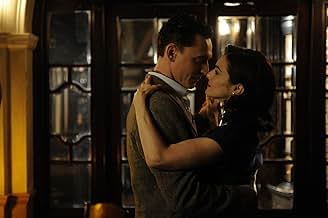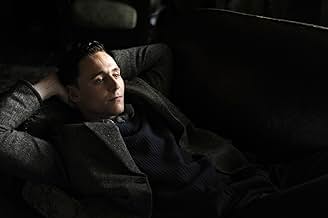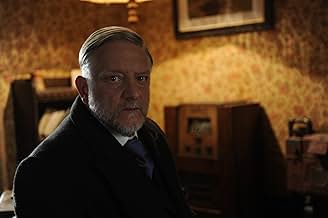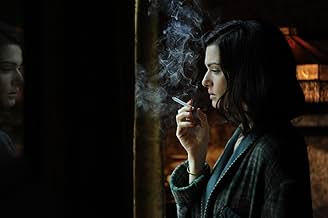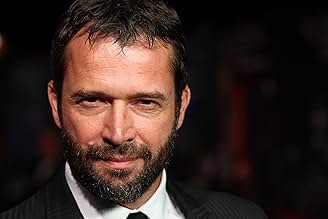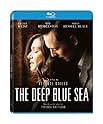AVALIAÇÃO DA IMDb
6,2/10
17 mil
SUA AVALIAÇÃO
A esposa de um juiz britânico é pega em um caso de amor autodestrutivo com um piloto da Força Aérea Real.A esposa de um juiz britânico é pega em um caso de amor autodestrutivo com um piloto da Força Aérea Real.A esposa de um juiz britânico é pega em um caso de amor autodestrutivo com um piloto da Força Aérea Real.
- Direção
- Roteiristas
- Artistas
- Prêmios
- 5 vitórias e 13 indicações no total
Jorge Ojeda-Dávila
- Man in Bunker Bed
- (não creditado)
Owen Thomas
- Caretaker
- (não creditado)
- Direção
- Roteiristas
- Elenco e equipe completos
- Produção, bilheteria e muito mais no IMDbPro
Avaliações em destaque
"Love, that's all." (Hester responds to her husband when he asks her what happened.)
No film in recent memory is as depressing as The Deep Blue Sea, Terence Davies' adaptation of Terence Rattigan's play. In either venue, the story of Lady Hester Collyer (Rachel Weisz) and her infidelity will sear your brain in recognition of the perfect storm of love and lust sung to the tune of 1950's conservatism, which largely meant staying with a spouse regardless if it's a loveless marriage.
Freddie (Tom Hiddleston), a WWII Brit flyboy, hasn't graduated yet from the romance of that war to the responsibilities of true love in civilian life. Hester unfortunately is ripe for romance with him as her older husband, a high court judge and a peer, is caring but far too reserved to provide a tender woman with the love she needs.
This is a simple film of measured speech in the tradition of West End thespian greatness. Unlike the orderly upper class, love is not simple but rather messy. In the claustrophobia of her apartments, either beautifully appointed with Sir William Collyer (Simon Russell Beale) or bare with Freddie, Hester is always waiting, either for her husband to love her or her lover to stay with her. Ironically Sir William is waiting, too, with love taking its measure of despair from those who love. As for charming Freddie, he is exuberant, careless, and destructfully self-centered.
Davies and Rattigan intercut between times to make The Deep Blue Sea seem just that: fragmented and deeply melancholic. Yet despite the incoherence, you'll not see a better acting trio this year. Where the play lacks vibrancy or heart, the actors give it their best.
When Freddie consoles Hester upon leaving her with this cliché, "Never too late to start again, isn't that what they say?" he is also hitting the center of her tragedy—she is so passive that this may be the first and last adventure she will ever have.
All that's left is the estranging deep blue sea:
Who ordered that their longing's fire Should be as soon as kindled, cooled?
Who renders vain their deep desire?
A God, a God their severance ruled!
And bade betwixt their shores to be The unplumbed salt, estranging sea.
Matthew Arnold, "To Marguerite—Continued"
No film in recent memory is as depressing as The Deep Blue Sea, Terence Davies' adaptation of Terence Rattigan's play. In either venue, the story of Lady Hester Collyer (Rachel Weisz) and her infidelity will sear your brain in recognition of the perfect storm of love and lust sung to the tune of 1950's conservatism, which largely meant staying with a spouse regardless if it's a loveless marriage.
Freddie (Tom Hiddleston), a WWII Brit flyboy, hasn't graduated yet from the romance of that war to the responsibilities of true love in civilian life. Hester unfortunately is ripe for romance with him as her older husband, a high court judge and a peer, is caring but far too reserved to provide a tender woman with the love she needs.
This is a simple film of measured speech in the tradition of West End thespian greatness. Unlike the orderly upper class, love is not simple but rather messy. In the claustrophobia of her apartments, either beautifully appointed with Sir William Collyer (Simon Russell Beale) or bare with Freddie, Hester is always waiting, either for her husband to love her or her lover to stay with her. Ironically Sir William is waiting, too, with love taking its measure of despair from those who love. As for charming Freddie, he is exuberant, careless, and destructfully self-centered.
Davies and Rattigan intercut between times to make The Deep Blue Sea seem just that: fragmented and deeply melancholic. Yet despite the incoherence, you'll not see a better acting trio this year. Where the play lacks vibrancy or heart, the actors give it their best.
When Freddie consoles Hester upon leaving her with this cliché, "Never too late to start again, isn't that what they say?" he is also hitting the center of her tragedy—she is so passive that this may be the first and last adventure she will ever have.
All that's left is the estranging deep blue sea:
Who ordered that their longing's fire Should be as soon as kindled, cooled?
Who renders vain their deep desire?
A God, a God their severance ruled!
And bade betwixt their shores to be The unplumbed salt, estranging sea.
Matthew Arnold, "To Marguerite—Continued"
After watching the Terence Rattigan DVD collection (with most of the adaptations being from the 70s and 80s) when staying with family friends last year, Rattigan very quickly became one of my favourite playwrights and he still is. His dialogue is so intelligent, witty and meaty, his characterisation so dynamic, complex and real and the storytelling so beautifully constructed.
'The Deep Blue Sea' may not be among my favourite Rattigan plays ('The Browning Version', 'The Winslow Boy', 'Separate Tables'), but it's still wonderful and distinctively Rattigan. The writing is 24-carat Rattigan and the story is timeless in its searing emotion and romantic passion. It's very sharply observant and witty at times too. Of the four versions seen of 'The Deep Blue Sea' (this, Penelope Wilton, Vivien Leigh and Helen McCrory), this one is my least favourite, the McCrory stage version coming out on top.
It certainly has its merits. Its best asset is the acting, with the creme De la creme being a stunning Rachel Weisz, a heart-breaking, passionate and sympathetic performance but with a dignity and strength that prevents Hester from being too passive. Tom Hiddleston brings charm to a very caddish role, while Simon Russell Beale successfully stops Collyer from being too one-sided and Barbara Jefford is suitably icy. Karl Johnson is a kindly Mr Miller and Ann Mitchell is solid as rocks. Weisz and Hiddleston have an intense and poignant chemistry together.
Visually, 'The Deep Blue Sea' looks beautiful. Especially the sublime and hauntingly atmospheric cinematography, which perfectly complements the sumptuous, evocative period detail. Terence Davies captures the passionate intensity and searing emotion of the story very well, there are some very affecting moments here and the tea scene at the mother's house is very well written and acted and the ending is powerful.
Rattigan's writing shines on the most part, heavy on talk (true of the play and Rattigan in general) but intelligent, sharply observant, thought-provoking and full of pathos and insight.
However, some aspects of 'The Deep Blue Sea' frustrate annoyingly. Too often, the film mood-wise takes itself too heavily and too seriously. The play has a serious subject, but Rattigan also in the play gave it his usual wit and verve that helped it not get too heavy. This wit and verve is completely lost here and as a consequence the film feels too dark in terms of mood and overly gloomy and the leaden pace in some scenes, which felt like it was stretched to pad things out, disadvantages it further.
Didn't know what to make of the music. With the pre-existing music, it is lovely music on its own but didn't fit with the film, being used in a way that felt overused and excessive that made the story more melodramatic than it actually is. Barber's beautiful Violin Concerto, played just as well by Hilary Hahn in one of the more famous interpretations of the work, is particularly true to this, on its own lovely, excessively melodramatic in how it was used in the film.
First 10-15 minutes were puzzling, with images that came over as very fragmented and self-indulgent and the flashbacks don't add as much as they ought and convolute the storytelling. Those unfamiliar with the play should not be put off and think the play is like how the story is presented here, with the messing around of chronology the story felt jumbled, disjointed and incomplete here whereas the structure and character motivations (which were not explored enough here meaning that the complex characters are not as complex) are much clearer in the play.
Overall, a lot of beautiful things but it was very frustrating when reminded constantly at how so much better the film could have been if told with more clarity and taken less seriously. 6/10 Bethany Cox
'The Deep Blue Sea' may not be among my favourite Rattigan plays ('The Browning Version', 'The Winslow Boy', 'Separate Tables'), but it's still wonderful and distinctively Rattigan. The writing is 24-carat Rattigan and the story is timeless in its searing emotion and romantic passion. It's very sharply observant and witty at times too. Of the four versions seen of 'The Deep Blue Sea' (this, Penelope Wilton, Vivien Leigh and Helen McCrory), this one is my least favourite, the McCrory stage version coming out on top.
It certainly has its merits. Its best asset is the acting, with the creme De la creme being a stunning Rachel Weisz, a heart-breaking, passionate and sympathetic performance but with a dignity and strength that prevents Hester from being too passive. Tom Hiddleston brings charm to a very caddish role, while Simon Russell Beale successfully stops Collyer from being too one-sided and Barbara Jefford is suitably icy. Karl Johnson is a kindly Mr Miller and Ann Mitchell is solid as rocks. Weisz and Hiddleston have an intense and poignant chemistry together.
Visually, 'The Deep Blue Sea' looks beautiful. Especially the sublime and hauntingly atmospheric cinematography, which perfectly complements the sumptuous, evocative period detail. Terence Davies captures the passionate intensity and searing emotion of the story very well, there are some very affecting moments here and the tea scene at the mother's house is very well written and acted and the ending is powerful.
Rattigan's writing shines on the most part, heavy on talk (true of the play and Rattigan in general) but intelligent, sharply observant, thought-provoking and full of pathos and insight.
However, some aspects of 'The Deep Blue Sea' frustrate annoyingly. Too often, the film mood-wise takes itself too heavily and too seriously. The play has a serious subject, but Rattigan also in the play gave it his usual wit and verve that helped it not get too heavy. This wit and verve is completely lost here and as a consequence the film feels too dark in terms of mood and overly gloomy and the leaden pace in some scenes, which felt like it was stretched to pad things out, disadvantages it further.
Didn't know what to make of the music. With the pre-existing music, it is lovely music on its own but didn't fit with the film, being used in a way that felt overused and excessive that made the story more melodramatic than it actually is. Barber's beautiful Violin Concerto, played just as well by Hilary Hahn in one of the more famous interpretations of the work, is particularly true to this, on its own lovely, excessively melodramatic in how it was used in the film.
First 10-15 minutes were puzzling, with images that came over as very fragmented and self-indulgent and the flashbacks don't add as much as they ought and convolute the storytelling. Those unfamiliar with the play should not be put off and think the play is like how the story is presented here, with the messing around of chronology the story felt jumbled, disjointed and incomplete here whereas the structure and character motivations (which were not explored enough here meaning that the complex characters are not as complex) are much clearer in the play.
Overall, a lot of beautiful things but it was very frustrating when reminded constantly at how so much better the film could have been if told with more clarity and taken less seriously. 6/10 Bethany Cox
I've been putting off review The Deep Blue Sea. Terrence Davies' remake of the 1950′s film based on the stage-play is a curious piece which I'm still struggling to get my head around.
It's a strangely polarising beast which split me between annoyance and er enjoyance
Here's the deal. On the one hand. It's a self-consciously old-fashioned portrayal of love and life in 1950′s London. Rachel Weiss plays Hester trapped in a flat and dull marriage she finds physical and emotional release in the arms of Freddie (played by Tom Hiddleston) a magnetic yet damaged WW2 pilot who is struggling to adjust to post-war life. The story is stylistic lavish with intimate set-pieces, evocative lighting and a mood of emotional frustration. What's not is as important as what is not said. There's evocations of Brief Encounter and Powell & Pressburger. An impressive meditation on love in all its forms and the damage it can cause.
On the other hand. It's an out-dated throw-back from a director who is stuck in time with a Britain that never really existed. Pampered hoity-toity, plummy-types (Hester? Freddie? Oh, 'k off!) moping and whining while the salt of the earth "Cor Blimey" types are just busy getting by. Posh types mope. Look out of windows. Smoke. Mope a bit more. Look out of more windows. Have a bit of a row. Cry. Look out of even more windows. Gah! Hester treats her husband like rubbish. Freddie treats Hester like rubbish. Hester treats herself like rubbish. It's so mannered and drenched in stylistic devices and cinematic tropes that they become at best distracting, at worst like a cinema school project with a budget.
So where does that leave us? Nostalgic meditation on love? Or stylised bore-fest of posh-types gagging for it? To be honest I'm still stuck between a rock and a hard place. Between, the devil and the . hmmm hang-on . it's suddenly occurred to me that maybe that's the point. Christ, I think I need to watch something stupid to clear my brain.
It's a strangely polarising beast which split me between annoyance and er enjoyance
Here's the deal. On the one hand. It's a self-consciously old-fashioned portrayal of love and life in 1950′s London. Rachel Weiss plays Hester trapped in a flat and dull marriage she finds physical and emotional release in the arms of Freddie (played by Tom Hiddleston) a magnetic yet damaged WW2 pilot who is struggling to adjust to post-war life. The story is stylistic lavish with intimate set-pieces, evocative lighting and a mood of emotional frustration. What's not is as important as what is not said. There's evocations of Brief Encounter and Powell & Pressburger. An impressive meditation on love in all its forms and the damage it can cause.
On the other hand. It's an out-dated throw-back from a director who is stuck in time with a Britain that never really existed. Pampered hoity-toity, plummy-types (Hester? Freddie? Oh, 'k off!) moping and whining while the salt of the earth "Cor Blimey" types are just busy getting by. Posh types mope. Look out of windows. Smoke. Mope a bit more. Look out of more windows. Have a bit of a row. Cry. Look out of even more windows. Gah! Hester treats her husband like rubbish. Freddie treats Hester like rubbish. Hester treats herself like rubbish. It's so mannered and drenched in stylistic devices and cinematic tropes that they become at best distracting, at worst like a cinema school project with a budget.
So where does that leave us? Nostalgic meditation on love? Or stylised bore-fest of posh-types gagging for it? To be honest I'm still stuck between a rock and a hard place. Between, the devil and the . hmmm hang-on . it's suddenly occurred to me that maybe that's the point. Christ, I think I need to watch something stupid to clear my brain.
The Deep Blue Sea is a dramatic romance which takes place around the post-war (WWII) period where the young wife of a British judge starts having a love affair with a royal air force pilot. The confusion and complexity or their situation puts their love into some strong tests. Mostly for their own self-challenge. Rachel Weisz is mature and amazing as a leading actress, and then comes Tom Hiddleston who unveils a beautiful supporting performance and freshens up a little bit the foggy mood of the film.
Terence meets Terence and a wonderful theatrical film comes to life. T. Davies wrote the screenplay and also directed the movie based on a love story play by T. Rattigan. The cinematography is absolutely theatrical. Feels like a never-ending stage. Therefore, expect some -not very long- slow scenes accompanied with instrumental classic music. The story leads you to expect and understand the outcome as it is.
If you want to see a good drama, this romantic one may be it.
Terence meets Terence and a wonderful theatrical film comes to life. T. Davies wrote the screenplay and also directed the movie based on a love story play by T. Rattigan. The cinematography is absolutely theatrical. Feels like a never-ending stage. Therefore, expect some -not very long- slow scenes accompanied with instrumental classic music. The story leads you to expect and understand the outcome as it is.
If you want to see a good drama, this romantic one may be it.
i saw this with twenty something people. This was not a movie for them, but it is a most superior film for older people who have seen people live torturous lives. Why people do things that hurt themselves is a intriguing question which fascinates psychologists and artists alike. No one has come up with a satisfactory answer, not even a plausible one, and Freud leads the list of the clueless. Thus, Hester (played by a wonderful Rachel Weisz) can fascinate those of us who care about the inner working and emotional vicissitudes of a self destructive woman and who will learn about the human condition by considering her behavior. Simon Beale and Tom Hiddleston, the men in her life, are equally impressive performers playing equally limited (Beale) and troubled (Hiddleston) persons.
First, I think most people don't know where the title comes from. A song popular during the second world war (a recent event in this film), has the line "we're caught between perdition and the deep blue sea." This is an apt description of the three protagonists.
This film might be quite tedious for those in a hurry to move on with their lives. The three main characters are stuck and seem to have no capacity for getting unstuck. This is tough to contemplate if you can't wait for your tomorrow's great triumph, or if you see romance as a smooth road to your personal paradise.
The rest of us are mesmerized as these troubled lives unfold on screen. Yes, the mood and physical atmosphere are almost relentlessly dark (it needn't have been); The film is completely without humor, and it is much too slow moving. These are minor difficulties. The script and performances are magnificent.
First, I think most people don't know where the title comes from. A song popular during the second world war (a recent event in this film), has the line "we're caught between perdition and the deep blue sea." This is an apt description of the three protagonists.
This film might be quite tedious for those in a hurry to move on with their lives. The three main characters are stuck and seem to have no capacity for getting unstuck. This is tough to contemplate if you can't wait for your tomorrow's great triumph, or if you see romance as a smooth road to your personal paradise.
The rest of us are mesmerized as these troubled lives unfold on screen. Yes, the mood and physical atmosphere are almost relentlessly dark (it needn't have been); The film is completely without humor, and it is much too slow moving. These are minor difficulties. The script and performances are magnificent.
Você sabia?
- CuriosidadesTerence Davies wanted Rachel Weisz for the part of Hester Collyer after he noticed her "incredible talent" in Trazido pelo Mar (1997), even though he hadn't heard of her before seeing that film. He called his agent and asked, "Have you ever heard of this girl Rachel Weisz?" His agent laughed and said, "She's an Oscar winner!" Weisz was amused by this and said, "I don't think Terence [Davies] knows very well anyone who's not in a black and white film."
- Citações
Freddie Page: Let me give you a case: Jack loves Jill, Jill loves Jack. But Jack doesn't love Jill in the same way. Jack never asked to be loved.
Hester Collyer: And what about Jill?
Freddie Page: That's Jill's hard luck! I can't be bloody Romeo all the time!
- ConexõesFeatured in Maltin on Movies: The Watch (2012)
- Trilhas sonorasConcerto for Violin and Ochestra, Op. 14
Composed by Samuel Barber
Published by G. Schirmer, Inc (ASCAP)
Performed by Hilary Hahn & The Saint Paul Chamber Orchestra
Conducted by Hugh Wolff
Licensed courtesy of Sony Music Entertainment Inc.
Principais escolhas
Faça login para avaliar e ver a lista de recomendações personalizadas
- How long is The Deep Blue Sea?Fornecido pela Alexa
Detalhes
- Data de lançamento
- Países de origem
- Central de atendimento oficial
- Idioma
- Também conhecido como
- The Deep Blue Sea
- Locações de filme
- Empresas de produção
- Consulte mais créditos da empresa na IMDbPro
Bilheteria
- Faturamento bruto nos EUA e Canadá
- US$ 1.126.525
- Fim de semana de estreia nos EUA e Canadá
- US$ 123.841
- 25 de mar. de 2012
- Faturamento bruto mundial
- US$ 3.143.514
- Tempo de duração
- 1 h 38 min(98 min)
- Cor
- Mixagem de som
- Proporção
- 1.85 : 1
Contribua para esta página
Sugerir uma alteração ou adicionar conteúdo ausente



